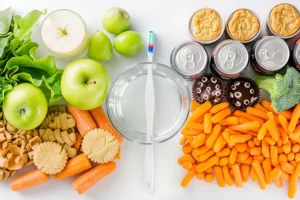Exploring the connection between diet and dental health reveals significant insights on how certain foods can influence oral well-being. Consuming sugar-laden beverages and snacks can lead to tooth decay and gum disease by providing food for harmful bacteria in the mouth. On the other hand, foods rich in calcium and phosphorus, such as cheese and nuts, can help protect and rebuild tooth enamel. It’s crucial to be mindful of what we eat not only for overall health but also to maintain a strong, healthy smile.
The Link Between Diet and Dental Health
The connection between diet and dental health is profound and multifaceted. What we eat and drink significantly impacts our oral hygiene and overall dental well-being. Poor dietary choices can lead to tooth decay, gum disease, and other oral health issues. Conversely, a diet rich in essential nutrients can help maintain a healthy mouth, preventing many common dental problems.
Studies have shown that a balanced diet not only contributes to general health but also plays a crucial role in oral health maintenance. Nutritional deficiencies can weaken the body’s immune system, making it harder to combat infections in the mouth. Thus, understanding the relationship between diet and dental health is vital for preventative care.

Furthermore, dental professionals often emphasize the importance of diet in their guidelines for maintaining oral hygiene. For instance, the American Dental Association recommends a diet low in sugars and high in fruits, vegetables, and whole grains to improve dental health. It’s a growing consensus that dietary habits are instrumental in shaping not only our dental health but also our quality of life.
How Diet Affects Oral Health
The foods and beverages we consume have a direct impact on the condition of our teeth and gums. Foods high in sugar and starch are known to contribute to the formation of plaque and cavities. Plaque is a sticky film of bacteria that forms on the teeth and gums, and it thrives on the sugar left in your mouth after eating.
When these bacteria consume sugar, they produce acids that can erode tooth enamel, leading to cavities. Acidic foods and drinks, such as citrus fruits and sodas, can also wear down enamel. Over time, this can result in significant tooth decay and sensitivity.
On the other hand, a diet rich in vitamins and minerals supports the health of your gums and teeth. Nutrients such as calcium and phosphorus help to remineralize tooth enamel, making it more resistant to decay. Therefore, what you eat is as crucial as how you care for your teeth.
Common Dietary Culprits of Dental Issues
Several common dietary habits and choices are notorious for causing dental issues. Here are some of the primary culprits:
- Sugary foods and beverages: Candy, cakes, cookies, and sugary drinks like soda are the leading causes of tooth decay.
- Starchy foods: Foods such as bread, pasta, and crackers can get stuck in your teeth, providing a breeding ground for bacteria.
- Acidic foods and drinks: Citrus fruits, wine, and certain sports drinks can erode tooth enamel.
- Sticky foods: Foods like dried fruits and caramel can linger on your teeth longer than other foods, increasing the risk of decay.
Avoiding or limiting these foods can significantly reduce the likelihood of developing dental problems. It’s also beneficial to practice good oral hygiene by brushing and flossing regularly to remove any food particles that may contribute to plaque formation.
The Role of Nutrients in Maintaining Oral Health
Nutrients play a vital role in maintaining oral health. For instance, calcium is essential for building and maintaining strong teeth. Dairy products, leafy green vegetables, and almonds are excellent sources of calcium. Phosphorus, found in meat, fish, and eggs, works in conjunction with calcium to strengthen tooth enamel.
Vitamin D is crucial as it helps the body absorb calcium and phosphorus. Exposure to sunlight and consuming foods like fatty fish and fortified dairy products can help you obtain adequate vitamin D. Vitamin C is another critical nutrient as it promotes healthy gums by supporting the connective tissues.
Other essential nutrients include:
- Vitamin A: Supports saliva production, which cleanses the mouth of harmful bacteria.
- Vitamin B complex: Helps prevent mouth sores and reduces inflammation of the gums.
- Zinc and fluoride: Aid in the repair and maintenance of tooth enamel.
Incorporating these nutrients into your diet can help you maintain optimal oral health. Remember, what you consume affects not just your body but also your oral health. For more tips on maintaining a balanced diet for your dental health, check out our other articles.
Foods to Avoid for Better Dental Health
Maintaining optimal dental health is not just about regular brushing and flossing; it significantly depends on your dietary choices as well. Certain foods and drinks can have a detrimental impact on your teeth and gums. Understanding these impacts and making informed choices can play a crucial role in preserving your dental health. In this section, we will discuss the types of foods you should avoid for a healthier smile.
Specifically, sugary and acidic consumables are among the top culprits that can wreak havoc on your dental health. Knowing why these foods are harmful and how they affect your teeth can help you make more conscious decisions about what you eat and drink. Let’s delve deeper into which specific foods and beverages to avoid for better dental health.
Sugary Foods and Drinks
Sugar is notorious for being a major contributor to dental problems. Consuming foods and drinks high in sugar provides a feast for harmful bacteria in your mouth. These bacteria produce acids that erode the enamel, leading to cavities and tooth decay. The World Health Organization recommends reducing sugar intake to less than 10% of your total daily energy intake to mitigate these risks.
Common sugary foods and drinks to avoid include:
- Sodas and soft drinks
- Confectionery like candies and chocolates
- Baked goods such as cakes, pastries, and cookies
Another factor to consider is the frequency of sugar intake. Frequent snacking on sugary foods or sipping sugary drinks throughout the day can continuously feed harmful bacteria. This constant assault on your teeth can lead to more significant dental issues over time. Therefore, it’s crucial to limit not only the amount but also the frequency of sugary food and drink consumption.
Acidic Foods and Beverages
Acidic foods and beverages pose another risk to dental health by eroding the enamel. Over time, this enamel erosion can lead to tooth sensitivity and increased vulnerability to decay. Citrus fruits, tomatoes, and vinegar-based foods are common examples of acidic consumables that should be consumed in moderation. In addition to foods, many popular beverages are highly acidic. These include:
- Citrus juices like orange and lemon juice
- Carbonated drinks, including sparkling water
- Wine, particularly white wine
The constant exposure to acids can weaken the enamel, making it easier for bacteria to cause cavities. One way to counteract this is by drinking water after consuming acidic foods or beverages. Water helps to rinse away the acids and can neutralize the pH levels in your mouth.
For those who enjoy acidic foods and drinks, it is advisable to incorporate them into meals rather than consuming them in isolation. Eating them with other foods helps to neutralize the acids, reducing their harmful effects on your dental enamel.
In conclusion, being aware of the foods and beverages that can negatively impact your dental health is the first step towards making better dietary choices. By avoiding or limiting sugary and acidic items, you can significantly improve your dental health. Don’t forget to read our other articles for more tips and advice on maintaining a healthy smile.
Healthy Eating Habits for Strong Teeth
Maintaining strong and healthy teeth isn’t just about brushing and flossing; it also involves a balanced diet. The foods you consume play a vital role in oral health, contributing to the strength, resilience, and overall condition of your teeth. By incorporating specific nutrients into your daily meals, you can enhance your dental health significantly.
Dental professionals and nutritionists agree that a diet rich in certain vitamins and minerals can fortify your teeth against decay and gum disease. Developing healthy eating habits can be a simple yet effective way to preserve your smile and avoid future dental problems.
This article will explore how including calcium-rich foods, phosphorus, and crunchy fruits and vegetables in your diet can help you achieve and maintain strong, healthy teeth. Keep reading to discover the best dietary choices for optimal oral health.
Incorporate Calcium-Rich Foods
Calcium is a fundamental nutrient for building and maintaining strong bones and teeth. Dairy products like milk, cheese, and yogurt are excellent sources of calcium. They not only help in strengthening the tooth enamel but also create a protective layer against harmful acids and bacteria.
In addition to dairy, there are several non-dairy options that are rich in calcium. Leafy greens such as kale and spinach, nuts like almonds, and fortified foods such as cereals and plant-based milk alternatives can also contribute significantly to your calcium intake.
Studies have shown that a diet deficient in calcium can lead to dental issues such as weakened enamel and a higher risk of cavities. To ensure you are getting enough calcium, aim to include a variety of calcium-rich foods in your daily diet.
Regular consumption of these foods can help in maintaining not just your oral health but also your overall skeletal health. It’s a win-win for your body!
Consume Phosphorus for Stronger Enamel
Phosphorus, often overshadowed by calcium, is another essential mineral crucial for tooth health. It works in tandem with calcium to develop and maintain tooth enamel. Phosphorus helps your body absorb and utilize calcium more efficiently, ensuring that your teeth remain strong and healthy.
Foods rich in phosphorus include meat, fish, eggs, dairy products, nuts, and whole grains. Incorporating these into your diet can help you achieve a balanced intake of both phosphorus and calcium.
According to dental health experts, a lack of phosphorus can lead to the weakening of tooth enamel, making teeth more susceptible to decay and damage. Therefore, it is vital to ensure that your diet includes adequate amounts of this mineral.
For optimal dental health, focus on a balanced diet that provides sufficient levels of both calcium and phosphorus. This combination will help maintain strong enamel and protect your teeth from potential damage.
The Benefits of Crunchy Fruits and Vegetables
Crunchy fruits and vegetables, such as apples, carrots, and celery, are not just good for your overall health; they have specific benefits for your teeth as well. These foods can act as natural toothbrushes, helping to remove plaque and food particles from your teeth as you eat them.
The high water content in crunchy fruits and vegetables also stimulates saliva production, which is essential for neutralizing acids in the mouth and washing away bacteria. Increased saliva flow can significantly reduce the risk of tooth decay and gum disease.
Additionally, these foods are usually rich in vitamins and minerals that are beneficial for oral health. For instance, carrots are high in vitamin A, which is crucial for maintaining the mucous membranes in the mouth and promoting overall oral health.
Incorporating crunchy fruits and vegetables into your daily diet can be a simple and effective way to support your dental hygiene. Not only do they provide essential nutrients, but they also help keep your teeth clean and your gums healthy.
By understanding the role of diet in maintaining strong and healthy teeth, you can make informed food choices that support your oral health. For more tips and insights on dental care, be sure to check out our other articles.
Practical Tips for Maintaining Dental Health Through Diet
A balanced diet not only benefits your overall health but also plays a crucial role in maintaining optimal dental health. Consuming the right foods can help protect your teeth from decay and other dental issues. This article delves into practical dietary tips for maintaining strong, healthy teeth and gums.
Recent studies have shown that diet has a direct impact on oral health. Certain foods can combat acid erosion, strengthen enamel, and promote periodontal health. By incorporating specific nutrients into your daily meals, you can significantly reduce the risk of dental problems and enjoy a brighter, healthier smile.
In the sections that follow, we’ll explore daily dietary practices that can enhance your oral health and provide practical tips for incorporating these practices into your routine. By making small yet consistent changes to your diet, you can achieve better dental health and prevent common dental issues.
Daily Dietary Practices for Better Oral Health
One of the key strategies for improving your oral health through diet is to incorporate foods that are rich in calcium and phosphorus. These minerals are essential for maintaining strong tooth enamel. Dairy products such as milk, cheese, and yogurt are excellent sources of calcium, while lean meats, nuts, and beans provide ample amounts of phosphorus. Including these foods in your daily diet can help fortify your teeth against decay and erosion.
Another crucial practice is to limit your intake of sugary and acidic foods, as they can contribute to the development of cavities and enamel erosion. Sugary snacks like candies, cookies, and soda can create an environment in your mouth that encourages the growth of harmful bacteria. Acidic foods such as citrus fruits and vinegar can weaken your enamel over time. Instead, opt for healthier alternatives like fresh fruits, vegetables, and whole grains.
Hydration also plays a significant role in maintaining oral health. Drinking plenty of water helps wash away food particles and bacteria from your mouth. Additionally, water contains fluoride, a mineral that strengthens teeth and prevents decay. Consider carrying a reusable water bottle with you throughout the day to ensure you stay hydrated and maintain a healthy mouth.
By integrating these daily dietary practices into your routine, you can enhance your oral health and reduce the risk of dental issues. Remember, small changes in your diet can lead to significant improvements in your dental well-being. Explore our other articles to continue learning about effective strategies for maintaining optimal oral health.
The Impact of Diet on Dental Health: Tips and Foods to Avoid
Understanding how diet affects dental health is crucial in maintaining a healthy mouth. Here, we explore the types of foods that can harm your teeth and offer useful advice to protect your dental well-being.
What are some common foods that negatively impact dental health?
Sugary foods and drinks, like candies, cakes, and soda, are well known for their detrimental effects on dental health. They contribute to tooth decay by feeding the bacteria that produce harmful acids in the mouth. Acidic foods and beverages, such as citrus fruits and vinegar-based dressings, can also erode tooth enamel. Additionally, sticky foods like dried fruits can linger on teeth surfaces, promoting decay. It’s advisable to minimize these foods and maintain proper oral hygiene practices to protect your teeth.

My name is Salman Kapa, a 73-year-old expert in bone regeneration and dental implantology. With decades of experience in the field, I am dedicated to advancing our understanding of oral health and hygiene. Through my research and writing, I aim to contribute to the development of innovative solutions in dental care.




